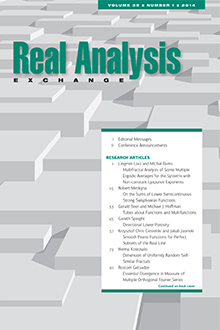Abstract
A measure space $(X, S, μ)$ is called almost finite if $X$ is a union of a set of finite measure and finitely many atoms of infinite measure. It is shown that Egoroff's Theorem for sequences of measurable functions holds if and only if the underlying measure space is almost finite. As a consequence we obtain several theorems on the interaction between convergences almost everywhere, almost uniform and in measure, respectively, with no preliminary conditions on the measure space $(X, S, μ)$, thus extending results from [2], [4], [6] and [10]. It is proved further that if $(X, S, μ)$ is almost finite (is not almost finite), then $ɸ : ℝ → ℝ$ preserves almost uniform convergence and convergence in measure, respectively, if and only if $ϕ$ is continuous (is uniformly continuous), thus augmenting a result of [3].
Citation
László Zsilinszky. "ON MEASURE SPACES WHERE EGOROFF'S THEOREM HOLDS." Real Anal. Exchange 20 (2) 799 - 804, 1994/1995. https://doi.org/10.2307/44152561
Information





